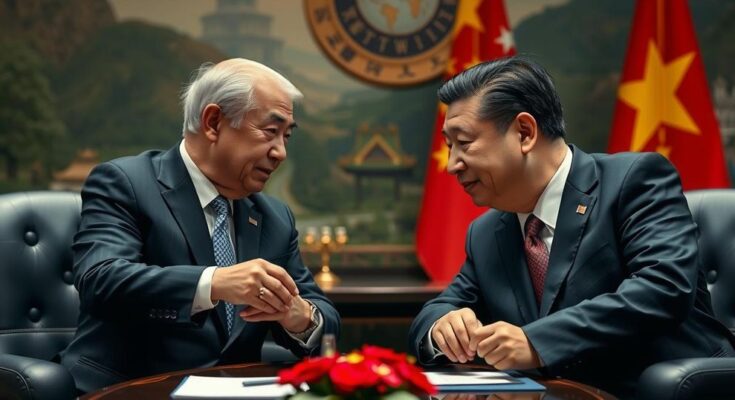President Biden’s final meeting with President Xi Jinping is centered on urging China to restrain North Korea’s military support for Russia’s war in Ukraine. This interaction comes as tensions rise in US-China relations, particularly concerning military cooperation and economic strategies. The upcoming transition to President-elect Donald Trump could further complicate these discussions, highlighting their importance in determining future diplomatic pathways.
In a significant last meeting before he vacates the presidency, President Joe Biden is set to engage with Chinese President Xi Jinping at the Asia-Pacific Economic Cooperation conference in Peru. The discussions will primarily revolve around the urgent need for China to intervene in North Korea’s support for Russia amid the ongoing Ukraine conflict. Biden, alongside South Korean President Yoon Seok Yul and Japanese Prime Minister Shigeru Ishiba, voiced concerns about North Korea’s military assistance to Russia, calling it a destabilizing cooperation. This meeting is pivotal as it reflects Biden’s belief in Xi as a crucial global counterpart and comes at a time of rising tension in US-China relations. Additionally, discussions may touch upon broader topics, including human rights, technology concerns, and the contentious Taiwan issue, particularly in light of the impending transition to President-elect Donald Trump, who has signaled a tougher stance on China. The context of this meeting is underscored by heightened US-China tensions, particularly concerning North Korea’s military alliances and the impact of Russia’s war in Ukraine. Recent intelligence indicates that North Korea has not only supported Russia but has also faced international scrutiny for its increased arms testing and the alleged provision of artillery to Moscow. Biden and Xi’s relationship has evolved significantly over their time in office, marking a critical axis in international relations, especially as both nations navigate a complex geopolitical landscape. With the US’s severe concerns regarding China’s military assertiveness in the South China Sea and their direct economic impacts, this meeting seeks to address pressing issues that affect regional stability and global politics. Furthermore, the backdrop of this meeting includes a pattern of distrust within US-China relations, as evidenced by multiple cyber espionage incidents attributed to China, heightened military provocations, and economic strategies prompting American businesses to shift their reliance away from China. This context is essential for understanding the stakes involved in the discussions between Biden and Xi, as well as the long-term implications for global stability under the new US administration. “It should not be in Beijing’s interest to have this destabilising cooperation in the region.” – Senior Administration Official. The anticipated meeting between Presidents Biden and Xi is poised to address critical global issues, particularly concerning North Korea and its complicity in Russia’s war efforts. With Biden’s imminent departure from office, this interaction may shape the future trajectory of US-China relations and influence strategies under a new administration. The success of this meeting could hinge on whether Biden can persuade Xi to leverage China’s economic clout to stabilize the precarious situation unfolding with North Korea. In conclusion, the forthcoming discussions between President Biden and President Xi represent both an important diplomatic effort to reduce tensions and a reflection of the deeper complexities inherent in US-China relations. As the world watches, the outcomes of these discussions may well set the tone for international cooperation during a time marked by geopolitical uncertainty, especially with the transition to a new administration in the United States.
The impending meeting between President Biden and President Xi Jinping arrives at a critical juncture in international relations, particularly concerning the geopolitical theater involving North Korea, Russia, and China. Biden’s efforts to encourage Xi to mitigate North Korea’s military support for Russia underscore the complexities of cooperation in a strategically volatile environment. This meeting follows a series of incidents highlighting the fragility of US-China ties, marked by increased military demonstrations, cyber espionage allegations, and shifting global economic policies that may affect the flow of investment and trade between the nations. The transitional nature of US leadership adds another layer of urgency to these discussions, as the incoming administration under President-elect Donald Trump is expected to adopt a more confrontational stance regarding China. Understanding this backdrop is essential for comprehending the potential consequences and outcomes of the Biden-Xi meeting.
As President Biden prepares for his last official meeting with President Xi Jinping, the focus on North Korea’s support for Russia is as urgent as it is complex. The interaction represents a critical opportunity for Biden to assert US interests and encourage a collaborative effort to stabilize a region fraught with potential conflict. This meeting could not only shape the ongoing dynamics between the US and China but also signal to the global community how international relations may evolve amidst shifting leadership. The effectiveness of this dialogue will be under scrutiny as it unfolds, carrying implications for years to come.
Original Source: www.hindustantimes.com




